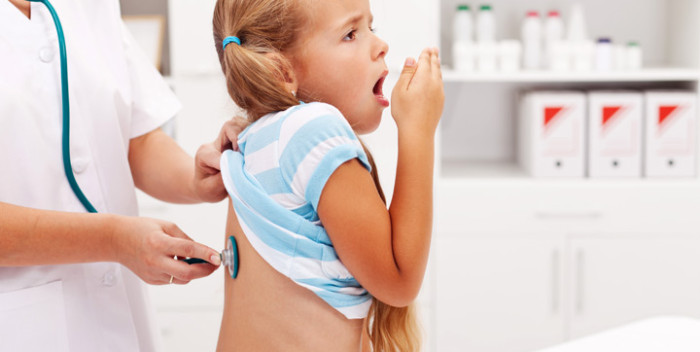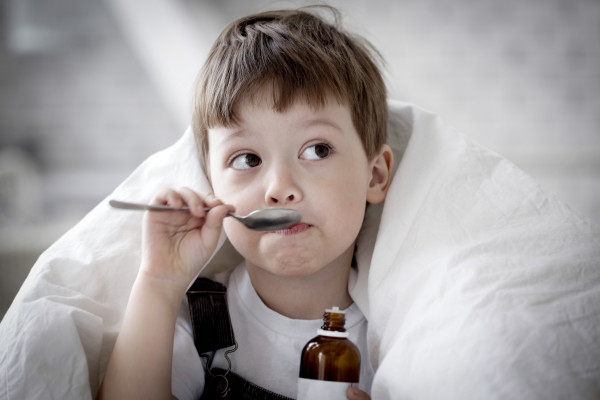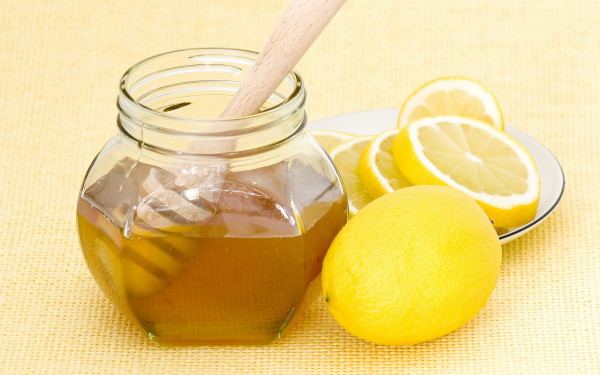Children's cough: causes and how to treat
When a child is ill, there is nothing worse in the world. Parents do not find a place for themselves, even if the baby has a banal runny nose. Young mothers are especially nervous when the baby begins to cough. Today we will talk about such a problem as cough in children. Let's discuss the reasons causing it and how to treat it.
Content
Causes of cough in a child
Coughing is a normal reaction of the body to dust and microscopic foreign bodies. Designed to expel debris that has entered the respiratory tract of a person. In the lungs there is phlegm, this is a substance secreted by the body to fight bacteria, dead cells of the epithelium. That is, viruses and bacteria are the immediate cause of cough. In the presence of a disease in the body, the amount of sputum varies. It can become too much or too little. Based on this, dry and wet coughs are distinguished.
Dry is considered unproductive, since there is no phlegm that could remove excess bacteria from the body. With a wet cough, which can be recognized by a specific sound that resembles a gurgle, excess phlegm leaves the respiratory tract naturally. And a person can only spit it out. Young children cannot spit out phlegm, but swallow it back. Thus, all bacteria causing the disease remain in the body. This is the whole difficulty of a child's cough.
A cough can talk about the following pathologies in the child's body:
- inflammatory processes in the nasopharynx - runny nose, adenoids;
- ARI, which in turn can lead to bronchitis, tracheitis or pneumonia;
- children's allergies;
- infections - measles, whooping cough;
- garbage that clogs the airways, the same dust;
- tuberculosis;
- disorders in the body of a nervous nature;
- respiratory pathology.
Cough without fever - causes
It is a mistake to think that a cough without a fever is harmless. On the contrary, he is very dangerous. Since it indicates a latent disease.
Diseases that are accompanied by a cough without fever:
- Internal inflammation or allergies. Often accompanied by sneezing and runny nose.
- Heart failure. Especially when lying down or after exercise.
- Bad ecology.
- Papillomas in the larynx.
- The onset of a venereal disease. It is accompanied by itching and rash.
- Pneumonia, bronchitis, tracheitis. As a consequence of the transferred ARVI.
- False croup.
- Tuberculosis.
Only a specialist can establish the exact cause of a cough. Do not try to be treated at home, urgently go to the clinic.
Treatment of dry cough in children
It is quite simple to understand that the child has a dry cough, which means that sputum is not coughing up and the infection does not wash out from the lungs. It sounds like barking, nothing wheezes or gurgles in the baby's chest.
Before starting treatment, it is necessary to accurately establish the cause of a dry cough. Most often this is a consequence of a viral disease. But a dry cough can also be caused by an infection such as measles. It is also not uncommon for an unproductive cough to be a herald of allergies.
General recommendations for the treatment of dry cough in a baby:
- bed rest;
- plentiful warm drink, homemade fruit drinks and compotes are best;
- remove from the diet all foods that irritate the throat - spicy, sour, salty or too hard;
- food easily digestible food, in small portions every 2-3 hours;
- gargling with any antiseptic;
- if the reason is ARVI, then you need to give the child an antiviral - Viferon, Kagocel and others;
- expectorant and thinning agent - ACC, Mukaltin and others;
- inhalation, using a nebulizer or in the old-fashioned way - breathing steam from potatoes, over a decoction of herbs like a string or calendula.
The doctor will tell you more about the treatment when he determines the cause of such a cough.
Treatment of wet cough in a child
A wet cough is often accompanied by a fever. This suggests that the body is fighting the infection with all its might. If the parents notice the following signs in the child, you must immediately go to the hospital.
- Blood in respiratory secretions.
- Green tinge of phlegm.
- High heat, more than 38 degrees.
- Wheezing.
- Shortness of breath.
- Refusal to eat or water.
- Complaints about pain in the chest.
It is especially dangerous if the cough as such occurs in a child of the first year of life. At this early age in children, all processes occur incredibly quickly. That is, in the morning there was only a cough, and by lunchtime it can already develop into bronchitis or pneumonia. It will not be possible to cure them without antibiotics.
The main therapy for a productive cough:
- sputum-thinning agent - ACC, Bromhexine;
- expectorant - Mukaltin, Bronholitin, licorice root;
- bed rest;
- drinking plenty of fluids, but do not force the child to eat;
- inhalations using saline or herbal decoction;
- massage the back and chest of the child for better sputum discharge, first lubricate your hands with medicinal ointment without a pungent odor.
It is also believed that light rhythmic tapping on the ribs of the back promotes more complete expectoration in babies. Acupuncture medicine recommends pressing on specific points on the body. For example, behind the ears or points on the hands and legs.
The best effect can be achieved by giving children an expectorant on an empty stomach.
Folk remedies for coughs for children
Traditional medicine recipes offer a wide variety of home remedies for coughs. Starting with such simple things as mustard plasters, mustard in socks, cans, and ending with an oil compress at night.
Here you can find the most effective folk cough recipes.
- Take a black radish, make a hole in it and fill it with honey. After that, the radish must be left for a day so that the medicinal juice comes out. It should be given to the patient 1 teaspoon 3 times a day. You can mix the resulting juice with milk so that the taste is not so unpleasant.
- A medium-sized onion or head of garlic should be chopped and poured over with half a liter of milk. Boil and let it brew for 4-5 hours. Take a tablespoon every 4 hours. Also, this remedy is famous as an excellent natural immunomodulator.
- Decoction of flowers and leaves of coltsfoot or linden. Raw materials can be bought at any pharmacy. Brew at the rate of 1 tablespoon per glass of boiling water. Insist and take 100 ml before meals.
- Carrot or cabbage juice mixed with sugar. In a ratio of 1: 2 and 1: 1, respectively.
- Rub the baby's back and breast with badger or lard. Better to do at night. Wrap the child warmly and let him sleep.
- Onion juice and honey are good natural antiseptics. If desired, onions can be substituted with lemon juice or aloe pulp.
- Milk with honey and cinnamon. If desired, you can replace honey and cinnamon with figs. Powerful anti-inflammatory agent.
- Tea with raspberry jam.
- Inhalation with medicinal herbs. For example, thyme, sage, mint, string, chamomile.
- Any berries, anti-inflammatory herbs and honey. Make a compote out of all this and water the baby abundantly. The compote must be warm - do not irritate the sore throat with low temperatures.
- It is very useful for sick children to eat eggs. These are easily digestible proteins, vitamins B, A, D. You can prepare the following remedy - take 2 yolks, mix with 2 teaspoons of butter. Add to them 1 dessert spoon of flour or starch and honey to taste. Mix everything thoroughly and give the baby 1 teaspoon 4-5 times a day. Only eggs must be of high quality, fresh and preferably homemade!








Personally, I like Prospan syrup the most. It quickly turns from dry to wet and it is easier to cough up. Usually, the cough can be defeated in a couple of days.